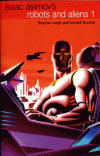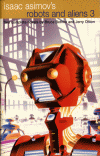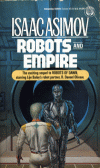This review will most likely contain spoilers for any previous books in the series, read at your own risk.
In Renegade, Cordell Scotten describes an alien species far different than that of the wolf-like pack in Book1. I found it a bit hard to relate to this new species as well as I could with the wolf creatures. I think that Scotten might have been trying a bit too hard to come up with complex aliens. Most of the unique mannerisms that were described seemed like they came out of nowhere. One thing that I did like from this book was that the relationship between Derec and Ariel is developed a bit more. Also, we start to understand a bit more about the Key of Perihelion.



The book left me thinking more about philosophy that the actual story. I suppose that is a good thing. In Asimov’s forward, he brings up the biblical story of the Good Samaritan. In this story, Jesus answers the question, “Who is my neighbor?” The moral of the story is that love and mercy should extend to all people (humans). History in our century shows that we as a society do not treat each other as neighbors. In this fictional future, this does not change much. The central theme of this book is three robots attempting to answer the question, “What is human?” so that the robots would know who they should serve and protect. Further, the programming that only biological humans are important enough to protect is questioned. Wolruf, a wolf-like alien, and the sentient bird-like aliens are included in the programming as ‘human’ so the robots would protect them. The robots had a hard time believing that under the definition that humans are the highest form of being that Derec, Ariel, and Avery were human. I really enjoyed the development of the Robots’ search for the truth.
The line that I will remember most is the answer a philosopher robot gives to the question, “What is a human?” It answers, “That depends on your point of view.” Our society can definitely relate to this…since some groups categorize other groups as sub-human based on race, gender, accent, and dare I say immigrations status.
I am beginning to question why, in this story, robots are only directed to protect humans and not all life…
The Three Laws of Robotics were developed initially to safeguard humans against robots. If I remember correctly, programmers also wanted to ensure that robots were loyal to the humans in case they encountered aliens. In Asimov’s “Robot and Foundation Universe” humans mainly worried about protecting themselves, not respecting all forms of life. They thought that humans were at the top of the food chain and should stay that way.
The Robot City/Aliens books was the first time Asimov allowed other authors to write using the Three Laws of Robotics. He challenged them to approach his work from a fresh angle. It’s been a while since I’ve read these, but from what I remember, these new authors did a pretty good job.